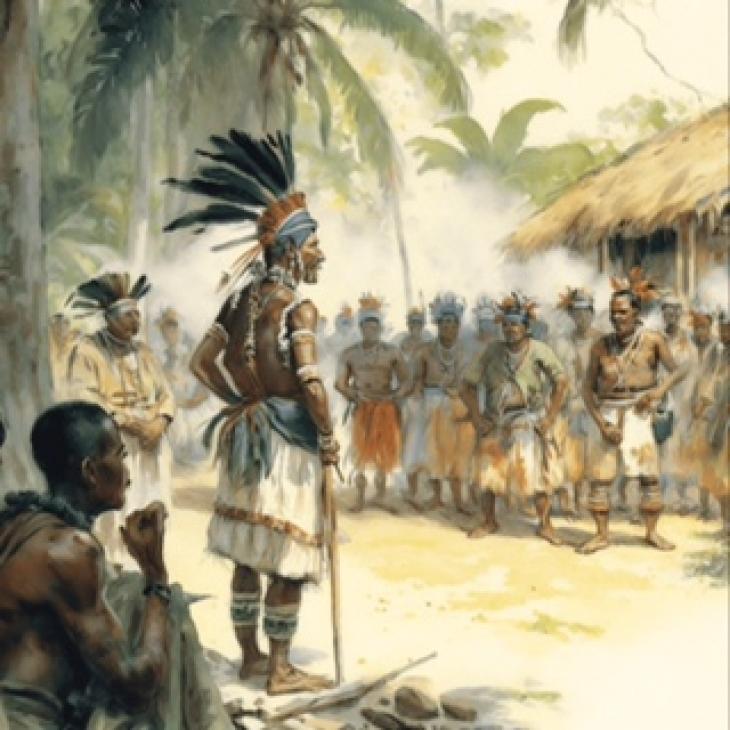
For centuries, history books have credited Christopher Columbus with the discovery of the Caribbean in 1492. But was he truly the first to set foot on these paradise islands, or had others arrived long before him? Some theories suggest that Norse explorers, such as Leif Erikson, may have ventured into the Atlantic centuries earlier. However, the Indigenous peoples of the Caribbean—the Taíno, Arawak, and Carib nations—were living on these islands for thousands of years before any European ever arrived.
So, who really discovered the Caribbean? Let’s dive into history, explore the competing claims, and uncover the truth.
The Indigenous People: The First True Discoverers
Long before any European explorer set sail, the Caribbean islands were home to thriving civilizations. The Taíno, Arawak, and Carib peoples had been living on the islands for thousands of years, with evidence suggesting that they migrated from South America as early as 4000 BCE.
These Indigenous communities built complex societies, developed advanced agricultural techniques, and established trade networks between the islands. They were the original inhabitants, with their own languages, religious beliefs, and cultural traditions.
So, can we really say Columbus “discovered” the Caribbean when millions of people were already living there? To them, the islands were not “new” lands but ancient homelands.
The Norse Theory: Did the Vikings Sail to the Caribbean?

One of the most intriguing theories is that Norse explorers from Scandinavia may have reached the Caribbean long before Columbus. The Vikings, led by Leif Erikson, are known to have established settlements in Vinland (modern-day Newfoundland, Canada) around 1000 CE, nearly 500 years before Columbus set sail.
Some researchers speculate that if the Vikings made it to North America, they could have continued sailing south along the Atlantic coast and eventually reached the Caribbean. However, there is no solid archaeological evidence—such as Norse artifacts or Viking settlements—to confirm that they ever set foot on the islands.
While it’s an exciting possibility, the Viking theory remains highly speculative.
Christopher Columbus: The Man Who Put the Caribbean on Europe’s Map

While Columbus wasn’t the first human to set foot in the Caribbean, he was undoubtedly the first European to document and publicize its existence to the rest of the world.
In 1492, Columbus set sail under the Spanish flag, searching for a new route to Asia. Instead, he arrived in the Bahamas, believing he had reached the outskirts of India. Over the next few years, Columbus and his crew explored several islands, including Cuba, Hispaniola (modern-day Haiti and the Dominican Republic), and Puerto Rico.
Columbus’s voyages had monumental consequences:
• His reports attracted massive European interest, leading to Spanish colonization.
• The arrival of Europeans forever changed the lives of the Indigenous people, introducing new diseases, forced labor, and eventually, European dominance over the region.
Because of this, Columbus is often credited as the “discoverer” of the Caribbean—but the truth is far more complex.
So, Who Really Discovered the Caribbean?
The answer depends on perspective:
• If we define “discovery” as the first human presence, then the Indigenous people of the Caribbean were the true discoverers.
• If we consider “discovery” as the first Europeans to arrive, then Norse explorers remain a possibility, but there is no concrete proof.
• If we see “discovery” as the first recorded encounter by Europeans that led to global awareness and colonization, then Columbus fits the description—though at great cost to the Indigenous people.
Perhaps the real lesson here is that history is not always as simple as the stories we learn in school. The Caribbean was not an “empty” land waiting to be found—it was already home to civilizations long before Columbus or any Viking ever set foot on its shores.
So, while Columbus may have put the Caribbean on the map for Europe, the true legacy of discovery belongs to the Indigenous peoples who called these islands home for thousands of years.
What do you think? Was Columbus really a “discoverer,” or just the man who brought the Caribbean into European history?




